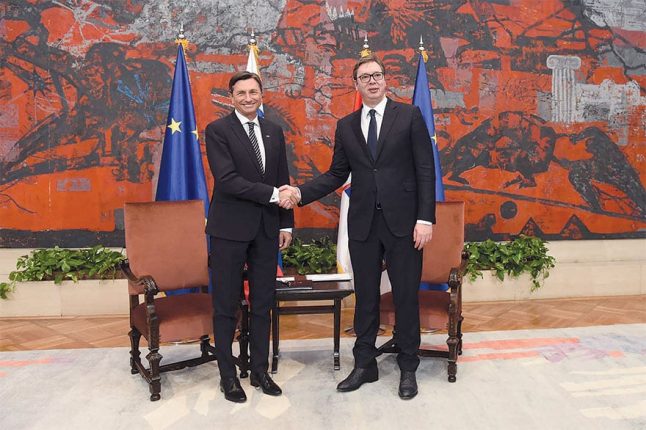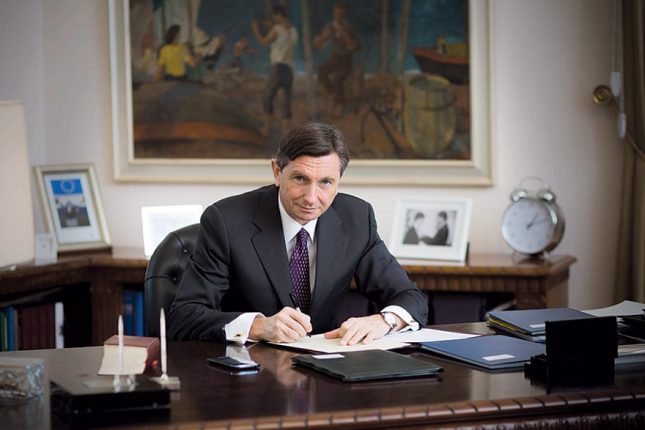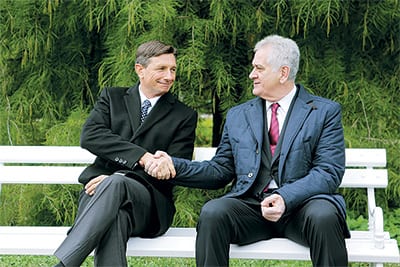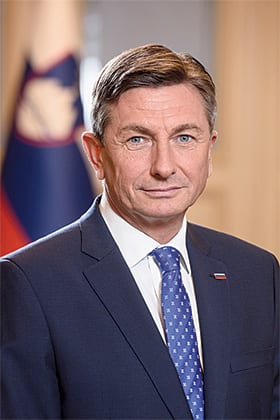Slovenia and Serbia are committed to regulating all bilateral and multilateral issues of the countries of Southeast Europe. Our views on certain issues are different, but they are not so irreconcilable that they would hinder the development of excellent political and economic relations
In this exclusive interview for CorD magazine, Slovenian President Borut Pahor mentions a mini anniversary for him as a statesman – the tenth anniversary of his first visit to Serbia, which he made as the then prime minister of Slovenia.
The decade since then has been marked by the strengthening of bilateral relations, says Pahor, who is convinced that friendship between Serbia and Slovenia can again be mentioned, despite conflicting views on some issues, primarily the status of Kosovo.
Mr President, how would you assess the success of your recent visit to Belgrade?
Despite having stated openly in his address to MPs of the National Assembly of Serbia that the upcoming challenges facing the EU serve to remove enlargement from the list of priorities, the Slovenian President reiterates that EU enlargement is in the interests of both Serbia and the EU itself.
Ten years ago, in 2009, I was the first Prime Minister of the Republic of Slovenia to officially visit Serbia, following years of poor relations between the two countries. I was received by then Prime Minister Mirko Cvetković and President Boris Tadić. The visit and discussions opened a new chapter in relations between our two countries. These relations used to be, and are still, marked by different views on the issue of Kosovo. However, since then, all challenges have been confronted in favour of mutual interests and benefits.
Five years ago, in 2014, I was the first President of the Republic of Slovenia to officially visit Serbia. My host that time was then President Tomislav Nikolić, while I was also received by the then Prime Minister and now President of the Republic of Serbia, Aleksandar Vučić.
Wide-ranging cooperation between the two nations and countries was in full swing. At that time, Slovenia was also selflessly helping Serbia in the face of severe floods. This was an illustration of the sincere friendship between the two nations, i.e. between Slovenians and Serbs, and between the two countries, i.e. between the Republic of Slovenia and the Republic of Serbia.
Slovenians and Serbs respect and are fond of one another. Slovenia and Serbia are friendly countries. They have been developing in-depth versatile relations and they also mutually help and support each other
During the last ten years, there have, of course, been many visits by prime ministers and presidents to Slovenia. However, a particularly fond memory of mine is of the visit of President Nikolić, with whom I unveiled a bench of friendship between Serbia and Slovenia in Tivoli Park and a statue of Mihajlo Pupin in Bled.

President Vučić and I were last month honorary patrons of a ceremonial evening prayer in the Orthodox Church in Maribor and a ceremony at the Slovene National Theatre on the occasion of the 800th anniversary of the independence of the Serbian Orthodox Church and the 600th anniversary of the birth of Katarina Branković, PCountess of Celje and the first Orthodox believer in Slovenia.
Slovenia and Serbia have not only settled open bilateral issues during this period but also enhanced economic cooperation and cultural exchanges, as well as intensifying friendliness and warmth at the personal level. President Vučić and I agreed that this recent visit would also provide a new impetus to strengthening relations in all areas. Slovenians and Serbs respect and are fond of one another. Slovenia and Serbia are friendly countries. They have been developing in-depth versatile relations and they also mutually help and support each other.
Whilst addressing the MPs of the Serbian National Assembly, you stated that “the Slovenian-Serbian friendship” is alive. Today, almost three decades after the collapse of the country we shared, in what is that friendship reflected?
During this time, trust and friendship have developed to the point at which we are cooperating at the level of presidents, within the Brdo–Brijuni Process, and at the level of prime ministers within the Berlin Process, which represents the economic framework of the Brdo–Brijuni Process and includes some of Europe’s most important countries.
The Brdo–Brijuni Process is informal but regular, and it has established a dialogue at the highest level between representatives of the region’s countries. It has progressed over the course of almost a decade through various stages and proved to be a powerful lever for maintaining and regulating our relations. I would like to thank Serbia and its President for participating in this process.
The rule of law is, of course, one of the most important issues in EU accession negotiations. At the same time, it is also extremely important for the country that’s set to become a new member state. Without the rule of law there can be no justice, no legal certainty and, last but not least, no progress
Our countries see the European Union as an area of reconciliation, peace, safety and prosperity. The security policies of our two countries differ, but we respect our difference and make every effort to ensure that doesn’t hinder the utilising of all other flexible opportunities.
Slovenia and Serbia are both committed to regulating all bilateral and multilateral issues of the countries of Southeast Europe. Our views differ on certain issues, but they are not so irreconcilable that they would hinder the development of excellent political and economic relations.
Opposition MPs weren’t present for your address, but they informed you of the reasons for their boycott of the session prior to its start. Did you understand their issues and how did you interpret that act?
I respect and accept their decision.
Do you share the opinion that the rule of law, democracy and respect for the rights of citizens are equally important criteria for Serbia’s accession to the EU as the resolving of the dispute with Priština?
The rule of law is, of course, one of the most important issues in EU accession negotiations. At the same time, it is also extremely important for the country that’s set to become a new member state. Without the rule of law, there can be no justice, no legal certainty and, last but not least, no progress.
 Slovenia supports the efforts of Belgrade and Priština to conclude agreements governing their relations. The concluded agreements must be respected by both parties.
Slovenia supports the efforts of Belgrade and Priština to conclude agreements governing their relations. The concluded agreements must be respected by both parties.
Regarding certain ideas to resolve the most sensitive bilateral issues, I would like to point out the basic prerequisite: negotiations should be conducted peacefully, with no threats or use of force, and should result in peaceful enforcement of the agreement, with no collateral security implications for the region.
Speaking in Priština last year, you promised to engage in convincing the five remaining EU member states to recognise the independence of Kosovo, provided that Priština fulfils the conditions of the Brussels Agreement. Today, when import duties are being applied to goods coming from Serbia, would you give up such an offer to Priština?
Slovenia supports efforts to normalise relations between Belgrade and Priština and understands that this is a highly sensitive and challenging internal political issue in Serbia.
The issue of recognising Kosovo’s independence is also one of the few issues where Slovenia and Serbia’s views diverge. I would like to add at this point that friendly relations between the two countries allow us to discuss issues on which our views differ openly, including the issue of recognising Kosovo’s independence.
The recent signing of the Treaty of Aachen by Germany and France, which I understand as a follow-up to the famous Élysée Treaty, fills me with great hope and confidence. The signing of this treaty is one of the few bright signs of the revival of the European idea for future needs
Let me reiterate our support for the Belgrade– Priština dialogue and stress the importance of implementing arrangements made to date and finding a comprehensive solution. Slovenia supports peaceful negotiations, without threats or the use of force, that must result in the peaceful implementation of agreements without any collateral security implications for the region.
Mr President, do you not find it somewhat unusual for Slovenia to call for Belgrade and Priština to resolve their dispute as soon as possible given that Slovenia led a decades-long dispute with Croatia over the Gulf of Piran?
Slovenia then demonstrated the great importance of national territorial claims, did it not?
With a view to a peaceful resolution of the border dispute, the Republic of Slovenia and the Republic of Croatia concluded the Arbitration Agreement and mandated the Arbitral Tribunal to determine the course of the boundary.
The dispute on this issue was resolved by the Final Award of the Arbitral Tribunal, which determined the boundary between Slovenia and Croatia.

Croatia rejected the Award, but this does not alter the fact that the dispute has been resolved. Due to the Croatian rejection of the Award, the only outstanding issue is its enforcement.
I am convinced that, sooner or later, the border between the two neighbouring countries will be established in line with the award of the Arbitral Tribunal.
The Arbitral Tribunal decided on the basis of the bilateral agreement concluded by the two governments, facilitated by the EU and ratified by the two parliaments; in Slovenia, it was also decided on by the people, in a referendum.
Thus, as neighbouring countries, Slovenia and Croatia have finally settled their border dispute in a peaceful and binding manner. It is now their task to enforce it peacefully.
Have you responded to the Socialist Party of Slovenia, which invited yourself and then PM Cerar to consider overturning the country’s recognition of Kosovo’s independence, reminding you of the continuing validity of UN Security Council Resolution 1244?
Slovenia has recognised Kosovo. Kosovo has also been recognised by most countries, both EU and UN member states.
Resolving relations with Priština is one of the key conditions for the continuation of Serbia’s EU integration. Addressing the MPs of the Serbian National Assembly, you didn’t seem overly optimistic regarding the speed of Serbia’s continuing European integration – not due to Kosovo, but rather as a result of the internal situation within the EU?
Ever since the two countries started settling bilateral relations, Slovenia has actively advocated and promoted Serbia’s alignment with, and accession to, the European Union. It has always been our opinion that Serbia’s accession to the European Union is in the mutual interests of Brussels and Belgrade and that it would contribute significantly to political and economic stability in this part of Europe.
Slovenia supports Serbia on its path to the European Union. Regardless of my assessment that enlargement dynamics will slow down, Slovenia will always actively highlight their significance. I wish Serbia the greatest success on this path. I know from the experiences of Slovenia that much depends on national social consensus when it comes to how quickly and successfully national legislation adapts to the Community Acquis and how difficult it is to convince the public that this must be done, although this is not immediately reflected in the speed of negotiations.
Will Slovenia this year commemorate the anniversary of 15 years since acceding to the EU?
Slovenia will definitely mark the 15th anniversary of its accession to the EU, in May this year.
Considering all the changes experienced within the EU since Slovenia became a member, and even more the current challenges – from Brexit to the strengthening of anti-EU sentiment in some member states – do you still believe that the community will survive?
In the current less predictable global situation, which has also become more complex in terms of security, Slovenia would certainly like to see a European Union that works more closely together and has more influence on the global stage.
Slovenia considers such a European Union to be of crucial importance. I, therefore, reiterate our commitment to all ideas that would give fresh impetus to European integration. This integration is presently at a standstill, which raises concerns. However, we wish to remain active in this regard. We have been taking initiatives, at governmental and non-governmental levels, to breathe new life into the European idea.
I believe that, given domestic and international circumstances, 2019 offers the current government the final opportunity to make certain strategic structural adjustment moves
The recent signing of the Treaty of Aachen by Germany and France, which I understand as a follow-up to the famous Élysée Treaty, fills me with great hope and confidence. The signing of this treaty is one of the few bright signs of the revival of the European idea for future needs. I am hopeful that, following the orderly withdrawal of the United Kingdom from the European Union, EU member states will have more time and political will to focus on securing a more successful and efficient common future. I personally believe that, provided European politicians listen to reason and summon the courage to commit themselves to new ideas regarding closer cooperation, most Europeans will embrace the future with gratitude.
You advocate within the European Union for better relations with Russia. What specifically did you want to say to Serbian MPs when you spoke about relations between Serbia and Russia and drew attention to the necessity of “well-organised relations with Brussels”?
As regards relations with the Russian Federation, but also with the U.S. and China, I have always pointed out that the orientation of Slovenia’s foreign and security policy is governed by its membership in the European Union and NATO.
In this sense, the U.S. is our ally and partner. It is our wish to further deepen our relations with this ally, regardless of certain differences of opinion regarding the importance of, and respect for, the Paris Agreement and the Iran nuclear deal.
Slovenia also wishes to have good and orderly relations with the Russian Federation and China, as two important superpowers that are not its direct political or military allies. For the EU, orderly relations – particularly with Russia – provide a guarantee of stability, which is why efforts should be made to address open issues with tolerance and dialogue.
Slovenia will pursue a foreign policy aimed at making as many friends around the world as possible, and no enemies.
According to the statistics of chambers of commerce, Slovenia has to date invested around 20 billion euros in Serbia. Do you see room for strengthening bilateral economic relations?
Economic cooperation has a special place in bilateral relations. It is very positive, intensive and diverse. There are more than 1,500 Slovenian companies registered in Serbia (approx. 800 of which are active), employing approximately 25,000 people.
 Slovenia, which ranks sixth to eighth among foreign investors in Serbia, is the second most important employer among foreign investors in Serbia. Among the countries of the Western Balkans, Serbia is the most important investment destination for Slovenian companies.
Slovenia, which ranks sixth to eighth among foreign investors in Serbia, is the second most important employer among foreign investors in Serbia. Among the countries of the Western Balkans, Serbia is the most important investment destination for Slovenian companies.
Serbia also remains Slovenia’s most important trade partner in Southeast Europe.
In recent years, trade in goods has slightly exceeded the value of a billion euros and has been increasing. In 2017, the value of the goods exchange reached its highest in the last 11 years, amounting to 1.34 billion euros.
And, notwithstanding the growth trend, ample business opportunities remain to boost economic cooperation, notably in the areas of environmental protection, digitalisation, transport and energy infrastructure, energy efficiency and renewable energy.
Individual reputed world economists, including your countryman Jože Mencinger, are warning about the possibility of a new world economic crisis. Are there indicators of such difficulties in the Slovenian economy?
In my opinion, Slovenia is now better prepared for a possible financial or economic crisis than it was ten years ago.
The effects of unfettered privatisation, a high share of state ownership, poor corporate governance, a weak legal framework for action against the abuse of all types of power, and similar structural problems are addressed more favourably today than they were ten years ago. However, Slovenia has not emerged as strongly as it could have from the crisis.
In this regard, I would like to draw attention to another position that I often repeated shortly after the beginning of the end of the recession five or six years ago, which was that there was a “danger of being too easily satisfied with too little”. I think we are now witnessing this. Slovenia is indeed in better shape structurally than it was before the crisis, but it did not make use of the crisis, and especially of the time afterwards, to carry out a more thorough overhaul.
This is partly due to the harsh economic and social experiences of 2009, which was also seen as both a cultural and political shock. When Slovenia eventually overcame the crisis, politicians and the public quickly felt relieved and did not proceed with the adoption of measures that would further build up our resilience to a recurring crisis.
I believe that, given domestic and international circumstances, 2019 offers the current government the final opportunity to make certain strategic structural adjustment moves.
| SECURITY
The security policies of our two countries differ, but we respect our difference and make every effort to ensure that doesn’t hinder the utilising of all other flexible opportunities |
AGREEMENTS
Slovenia supports the efforts of Belgrade and Priština to conclude agreements governing their relations. The concluded agreements must be respected by both parties |
SUPERPOWERS
Slovenia wishes to have good and orderly relations with the Russian Federation and China, as two important superpowers that are not its direct political or military allies |
|---|